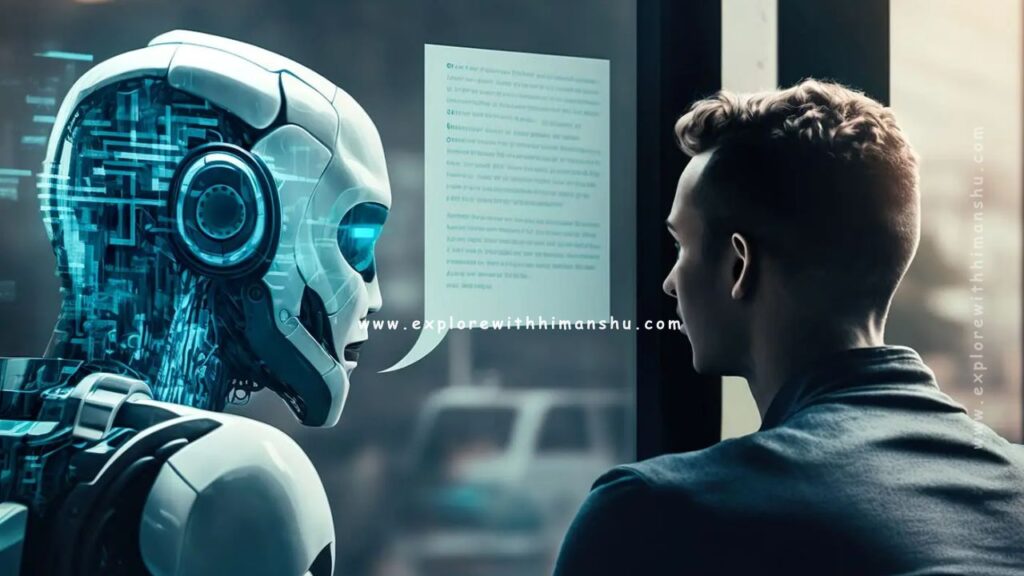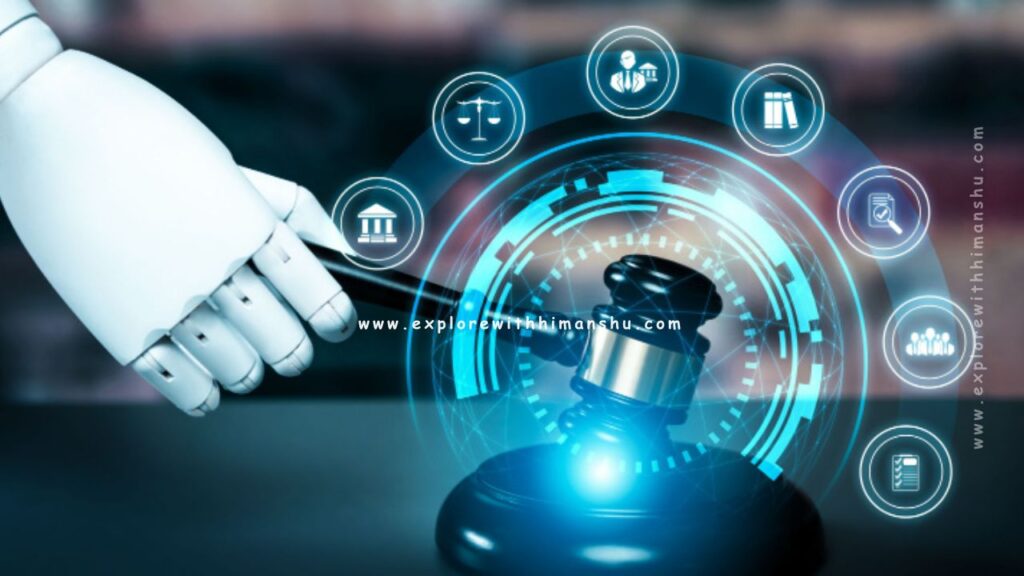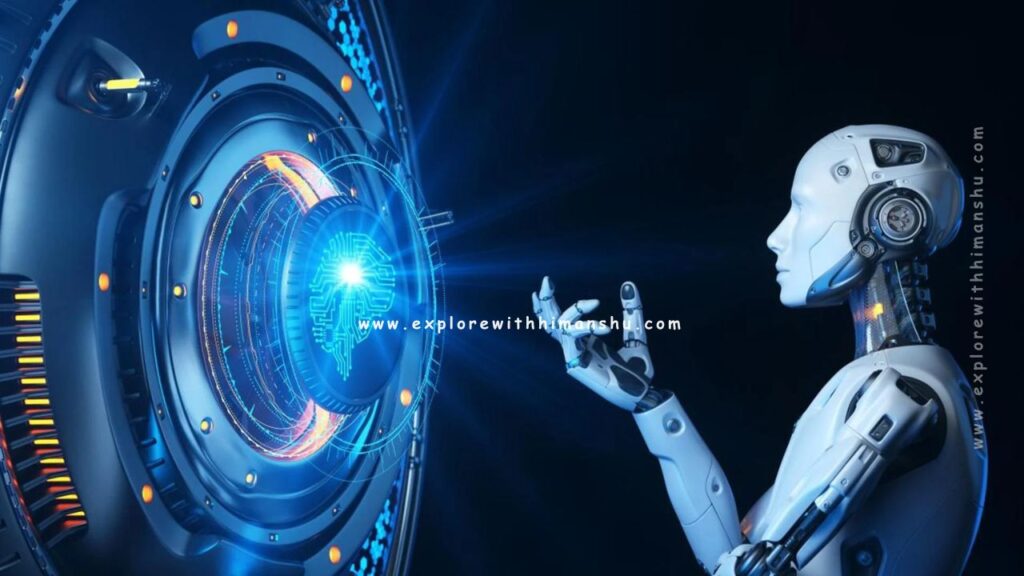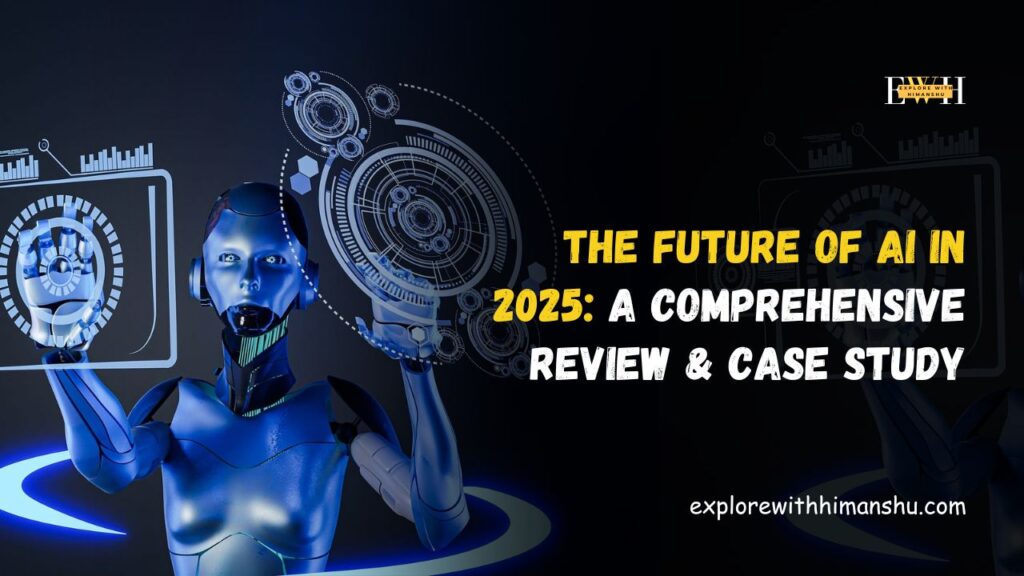Introduction :-
Artificial Intelligence (AI) has evolved significantly in recent years, becoming an integral part of industries, businesses, and everyday life. And now it is common place in industries and businesses and day to day activities. In the year 2025, AI is still a leader in pushing boundaries with progress in areas like NLP, computer vision, robotics, and automation. From medicine to finances, from gaming to marketing, AI is transforming the world.
Discover the future of AI in 2025 with this in-depth review. Explore groundbreaking innovations, real-world case studies, and expert insights on how artificial intelligence is transforming industries like healthcare, finance, and technology. Stay ahead with the latest AI trends
This review explores the state of AI in 2025, discussing major breakthroughs, real-world applications, ethical concerns, challenges, and case studies of businesses leveraging AI for growth and efficiency.

The Evolution of AI Technology
1. Early AI & Machine Learning (2010-2020)
- The rise of deep learning and neural networks.
- AI-powered virtual assistants like Siri, Alexa, and Google Assistant.
- AI in predictive analytics and recommendation systems (e.g., Netflix, Amazon).
2. The AI Boom (2021-2024)
- GPT-3, GPT-4, and multimodal AI models transforming content creation.
- AI-driven automation in customer support and business operations.
- Breakthroughs in AI-generated images, videos, and synthetic media.
- AI’s role in self-driving cars and healthcare diagnostics.
3. AI in 2025: The Current Landscape
- Advanced conversational AI with human-like interactions.
- AI-assisted medical procedures and robotic surgeries.
- AI-driven cybersecurity and fraud detection.
- AI-powered creative tools for music, design, and content generation.
The Future of AI in 2025: How Artificial Intelligence is Transforming Industries.
AI Applications in Different Industries
1. AI in Healthcare
- AI-powered diagnostics: AI models can analyze X-rays, MRIs, and CT scans with greater accuracy than human radiologists.
- Virtual health assistants: Chatbots like Ada Health provide instant medical guidance.
- Personalized treatment plans: AI algorithms help doctors tailor treatments based on genetic data.
Case Study: IBM Watson Health IBM’s Watson AI has been used to analyze patient data, predict disease progression, and assist doctors in diagnosing complex conditions.
2. AI in Finance & Banking
- Fraud detection: AI analyzes transaction patterns to identify suspicious activities.
- AI trading algorithms: Hedge funds and investment firms use AI for stock market predictions.
- Automated customer support: Chatbots like Bank of America’s Erica handle customer queries efficiently.
Case Study: JPMorgan’s COiN AI JPMorgan developed COiN, an AI-powered document analysis tool that processes legal contracts and financial documents 100 times faster than human analysts.
3. AI in Marketing & E-commerce
- Personalized recommendations: AI suggests products based on browsing history and preferences.
- AI-generated content: Platforms like Jasper AI create marketing copy, blog posts, and social media content.
- Chatbots & virtual assistants: AI-driven chatbots enhance customer engagement and support.
Case Study: Amazon’s AI-Powered Recommendations Amazon’s AI algorithms analyze purchase history and browsing behavior to personalize product suggestions, increasing conversion rates by over 35%.
4. AI in Automotive & Self-Driving Cars
- Advanced driver assistance systems (ADAS).
- Fully autonomous vehicles: Tesla, Waymo, and Apple continue developing self-driving technology.
- AI-powered traffic management: Cities use AI to optimize traffic flow and reduce congestion.
Case Study: Tesla’s AI-Driven Autopilot Tesla’s Full Self-Driving (FSD) AI uses computer vision and deep learning to navigate complex road conditions, improving road safety and efficiency.
5. AI in Cybersecurity
- Threat detection: AI detects potential cyber threats and prevents breaches.
- Behavioral analysis: AI monitors user behavior to detect anomalies.
- Automated response: AI-powered security systems respond to cyber threats in real time.
Case Study: Darktrace AI Cybersecurity Darktrace uses AI to detect and neutralize cyber threats before they cause harm, securing corporate networks worldwide.

Ethical Concerns & AI Regulation
While AI offers transformative benefits, it also raises ethical concerns:
- Bias in AI algorithms: AI models can inherit biases from training data, leading to unfair outcomes.
- Job displacement: Automation may replace human jobs, requiring workforce reskilling.
- Privacy issues: AI-driven data collection raises concerns about user privacy and surveillance.
Government & Industry Regulations
- EU AI Act (2025): Sets strict guidelines for AI safety and transparency.
- US AI Policy: Ensures ethical AI development and deployment.
- Global AI Ethics Consortium: Aims to establish international AI governance standards.
Key Takeaways from AI’s Evolution in 2025
AI is No Longer a Luxury, but a Necessity
In 2025, AI has become an essential part of daily life. From smart assistants like Chat GPT and Google Gemini handling complex tasks to AI-driven financial predictions ensuring better investment decisions, AI is deeply embedded in every aspect of business and personal life. Companies that fail to integrate AI into their workflows risk becoming obsolete in an increasingly automated world.
AI is Driving Hyper-Personalization and Efficiency
The ability of AI to analyze vast amounts of data in real time has led to unprecedented levels of personalization. Whether in marketing, healthcare, or customer service, AI algorithms are now capable of tailoring experiences based on individual preferences and behaviors. This has resulted in higher user engagement, better customer satisfaction, and increased efficiency in business operations.
AI-Powered Automation is Redefining the Workforce
While AI automation has led to fears of job displacement, it has also created new opportunities for skill development and innovation. Many repetitive and time-consuming tasks are now managed by AI, allowing human workers to focus on higher-value and creative problem-solving roles. The rise of AI-powered robotics, virtual assistants, and automated workflows is setting a new standard for productivity and efficiency.
AI and Ethics: The Challenge of Responsible Innovation
With great power comes great responsibility. The rapid deployment of AI systems has raised ethical concerns regarding bias, misinformation, surveillance, and job displacement. Companies and governments must work together to ensure AI remains ethical, unbiased, and beneficial to society. Policies around data privacy, AI regulation, and responsible AI development are now more critical than ever.
AI is Making Breakthroughs in Healthcare and Scientific Research
One of AI’s most promising applications in 2025 is in healthcare. AI is diagnosing diseases faster than doctors, predicting patient outcomes with remarkable accuracy, and personalizing treatments to individual genetic profiles. AI-driven drug discovery is reducing the time it takes to develop life-saving medications, while robotic surgeries powered by AI are achieving precision beyond human capability.
AI in Cybersecurity: Strengthening Digital Defenses
With cyber threats evolving at an alarming rate, AI is playing a crucial role in cybersecurity. AI-driven threat detection systems can identify vulnerabilities before cybercriminals exploit them. AI is also being used in fraud detection, biometric security, and digital identity verification, making online transactions safer and more reliable.
AI in Creative Industries: Revolutionizing Content Creation
AI is no longer limited to analytical tasks; it is now playing a key role in content creation, art, music, and film. AI-generated music, AI-written articles, and AI-driven video editing tools are pushing the boundaries of creativity, empowering artists and content creators with powerful new tools.

The Future of AI: Trends & Predictions
1. AI & The Metaverse
AI will play a critical role in creating immersive metaverse experiences, enabling virtual avatars, realistic AI NPCs, and AI-generated environments.
2. AI & Quantum Computing
Quantum AI is expected to revolutionize problem-solving, drug discovery, and encryption.
3. AI & Human Augmentation
AI-powered exoskeletons and brain-computer interfaces (BCIs) will enhance human capabilities in industries like healthcare and defense.
Conclusion – The Future of AI in 2025
AI in 2025 still influences progress in various fields such as healthcare, finance, marketing, cybersecurity, and transportation. Although AI poses ethical challenges, setting boundaries around its development will ensure it positively impacts society. Companies must adopt AI-centered approaches to remain competitive due to the constant development in AI. The progress of AI is boundless and companies that invest in AI today will define the future technology world.
The evolution of Artificial Intelligence (AI) has totally transformed industries, increased productivity, and spurred innovation in previously unseen quantities. Today, As we approach 2025, the rapid advancement of AI is continuing to disrupt healthcare, finance, education, cybersecurity, and many more. The combination of AI, machine learning, and deep learning is transforming the way businesses and individuals interact with technology.
With continuous advancements in AI, businesses must embrace AI-driven strategies to stay competitive. The future of AI holds immense potential, and organizations investing in AI today will shape the technological landscape of tomorrow.
Are you ready for the AI-driven future? Share your thoughts in the comments below!



